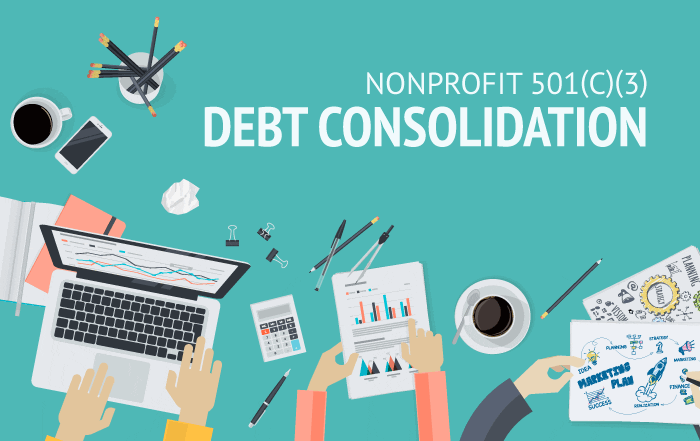
Currently, the average consumer has a credit card with a credit line of at least $4000 and about a quarter of Americans admit to maxing out at least one credit card. Obviously, people are in need of simple solutions to sooth the burdens of being buried in debt. A non-profit debt consolidation program can very well be the answer most consumers can look to and afford for debt relief.
The average consumer today carries about 3-5 credit cards, each with their own outstanding balance, creditor terms and fees, due dates, and varied billing cycles. A non-profit debt consolidation organization negotiates these terms with each individual creditor on behalf of the account holder to reduce interest rates, stop late, past due, over limit fees, and usually a lower monthly payment. In obtaining the best rates for the account holders, the non-profit org consolidates all the accounts into one monthly payment and the account holder then sends one payment each month to their consolidation agency to be disbursed to each individual creditor under the modified terms working through a non-profit organization.
This allows the consumer the following benefits:
Convenience of one monthly payment with a due date specified by the client.
A reduction in interest to a lower, fixed rate so that the debt can be paid back within a five year time frame, allotting the majority of the monthly payment each month to be applied to the principle balance versus the creditor fees.
Relief from harassing collection calls and creditor harassment.
Re-aging of accounts |certain creditors only |after a specified amount of time so the consumer can begin to report current |if they were past due | without paying the additional late fees.
Consecutive timely monthly payments to help improve credit rating over time.
A true non-profit organization begins their consultation with a free budget counseling session outlining and assessing your debt to income ratio on a monthly basis and reviewing assets versus liabilities. This is also known as a financial addendum. Some creditors require this information for enrollment in a consolidation program and others even base the interest reduction on said information. A non-profit agency usually receives better rates with the creditors on behalf of their clients as creditors acknowledge the educational process of the consultation and appreciate the non-profit ensuring a client not only understands their financial obligations, but ensures the programs success with the budget analysis, qualification process.
The mission of a good non-profit is not to charge you exorbitant fees for their services, but to get you out of debt and provide free educational information to ensure consumers do not make the same mistakes in the future. Remember that class in high school about how to manage credit card debt? Neither do we, because it didnt and still does not exist to this day. The American consumer is only partial to blame, so dont be too hard on yourself. And remember, you certainly are not alone in this credit debt debacle.
Here are a few good tips when shopping for a debt consolidation service to ensure your best interest is at hand and not the agency lining their pockets.
Check the company out on the Better Business Bureau. You can usually search for a business by zip then name of the organization,. The company website should have contact information including a physical mailing address. If not, this should be your first flag to stay clear.
Are they listed with the BBB?
What is their BBB rating?
Do they have complaints?
If so, how old and were they resolved or ignored by the company?
What type of fees do they charge for their service?
Does the first payment go out to the creditors? Every payment less their nominal monthly fee should go out as received and cleared from client.
How much is the monthly service fee? This really should not exceed an average maximum of $5 per account enrolled. Again, maximum.
Are there any pre-payment penalties if you are able to pay the debt off early? The answer should be no. You shouldnt be punished for finishing ahead of schedule.
Are there cancellation fees? Youve entered the program voluntarily and your exit should be the same. A true non-profit usually will not charge a fee for cancelling before completion but most creditors take it as an opportunity to reinstate your original rates, justifying it as a program default.
Debt consolidation is a great solution to getting out of debt and maintaining a positive credit score. However, consolidation is not for everyone. You have to be ready to stop spending on your accounts; credit cards are closed once they are enrolled in the program so spending on them is no longer an option. Remember, the point of a non-profit debt consolidation program is to get out of debt, not incur more. In addition, most creditors require that all accounts be enrolled into the program less one major credit card for emergencies. No, your Victoria Secret card cannot be left out for emergencies. Retail accounts are usually first to go and with good reason, their rates are usually much higher and some even extend billing cycles past the average 30 day cycle to further the applicable interest amounts. Yup, check your terms, its usually right there in that 2 size font, paragraph 86, line 1 million 524.
Seeking a company that provides real debt solutions is a job in itself. Good non-profits require their credit counselors to be certified and maintain their certification for continuing education as creditor guidelines and state practice regulations change frequently. They are also usually affiliated with an organization like ISO or AADMO. A true non-profit will also offer free budget help and a free debt consultation without any consumer commitment until they fully understand the program and recognize the potential savings to come with the enrollment. For more information feel free to call 800-905-1563 or visit our website,
Komentar
Posting Komentar